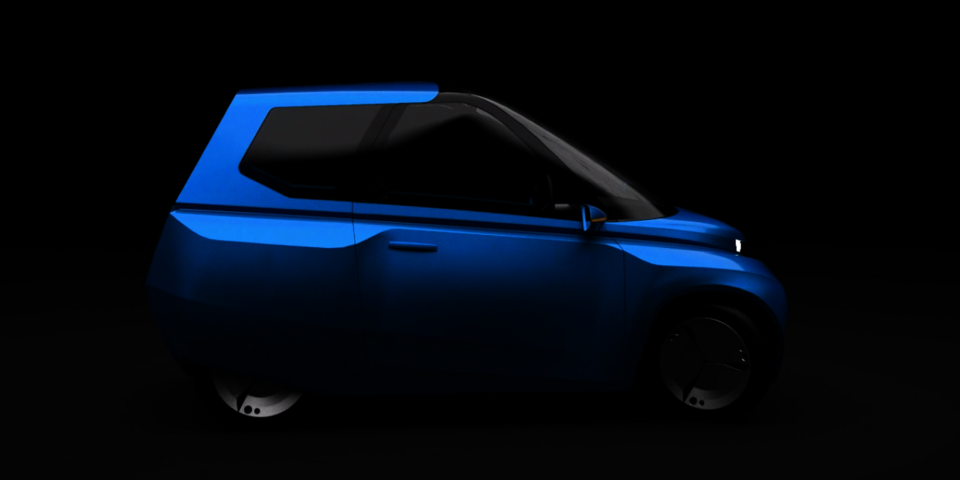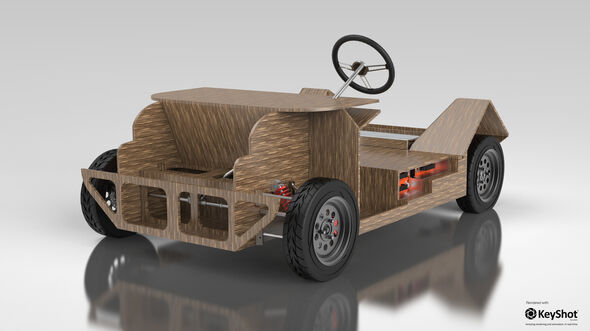In a well-filled Blauwe Zaal Tuesday evening the team revealed the futuristic design of the EM-05, which has been dubbed Noah. The team of 22 students from nine degree programs has been working since June 2017 on the new concept and design, with which they are keen to demonstrate that even cars can contribute to the circular economy.
The 350-kilo light Noah is a two-seater city car with modular batteries and a 240-kilometer range. Powered by 15 kW the vehicle can reach a top speed of 100 km per hour. The team believes this successor to Lina has the capacity to become the world's first circular car. This refers to the scope for recycling Noah's parts. Take the binding agent in the flax panels for example. Its components are vegetable-based as they were in Lina, but are now fully recyclable. In contrast to Lina, the binding agent (this time round PLA) and the flax structure can be separated from one another when the car is withdrawn from use.
Farewell to Eco-marathon vital to new concept
Team spokesperson Cas Verstappen talks of the difficult decisions the team had to make in arriving at the new concept. “Although we are proud of our history, after participating in the Eco-marathon we decided as a team that it doesn't sit comfortably with where we are headed as a team. Our new concept doesn't fall within the restrictions set by the Eco-marathon, in terms of weight and format, for example.”
The additional design scope created by this decision has been eagerly exploited by the extensive design team. They have, says Verstappen, made Noah into the kind of vehicle you'd be happy to park outside your home. In TU/e's Momentum building three designers fashioned a model that formed the basis for Noah's design.
The future of mobility and the option of entering Noah in a car-sharing network have also been considered. According to Matthijs Hoekstra, head of design, Noah is ideally suited to car-sharing: “Research shows that the average shared car is occupied by fewer than two people. That's why we opted for a two-seater.” Efficiency - notice the covered rear wheel - and generous vision, provided by the large windscreen, were other leading factors in the design of the small city car, explains the lead designer.
European tour
Since 2014 TU/ecomotive has been unable to achieve a valid result during the Eco-marathon. Most of the team's cars did not pass the inspection; in 2016 London's hills proved too great an obstacle for Lexy.
Given this track record, the conclusion that the team's aims are no longer in step with the economy-driven competition, is a logical one. But it did mean the team had to come up with an alternative. The students of TU/ecomotive are now keen to take Noah on a tour of Europe's major cities, to visit car manufacturers, universities and embassies and tell their story - and to demonstrate that even large products like cars can contribute to the circular economy.
For the most part Noah will very likely be transported from city to city, making some shorter trips under its own power now and then. In the cities the plan is to hold challenges at which Noah's qualities can be showcased, says Verstappen.
Noah's reveal, including license plates, is planned for June of this year - although Verstappen does admit this is ambitious. The European tour should follow in the second half of July.


![[Translate to English:] Paneel van biocomposiet. Afbeelding | TU/ecomotive](/fileadmin/_processed_/3/4/csm_tuecomotive_Biocomposiet_paneel_825d2c55db.jpg)

Discussion